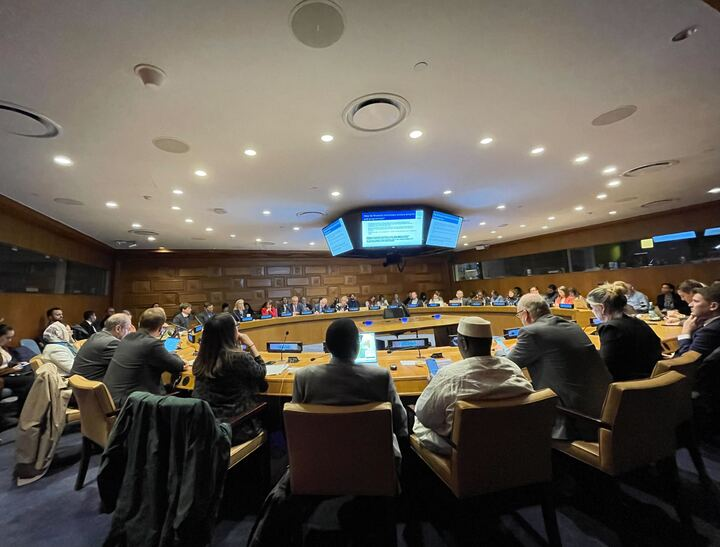A World Water Day Reflection
By: Waterkeeper Alliance

The following is a guest contribution from Bella Pitman, an undergraduate student at Brown University, who joined our delegation at the United Nations for the 2023 Water Conference.
You could call me a water nerd. As a Sophomore at Brown University it confuses most people that I am studying Environmental Science and Economics with a focus on water. They ask “what can you do in that area?” or “what do you actually invest in?”. After attending World Water Day at the United Nations in New York City as a guest of Waterkeeper Alliance, my primary takeaways from the day explain the world of water. Seated among excellencies, CEOs, dignitaries, and many just like me, discussions surrounded necessity for data, importance of place-based and local-led solutions, hardship of low population density or wealth and infrastructure/mindset lock-in.
Before any problem is tackled or often properly diagnosed, data collection to identify trends is of the utmost necessity. Two side-events I visited–Global Water Analysis Laboratory and “A New Era in Water Intelligence Driving Collective Action Everywhere”–both focused heavily on the types of data we need to collect. GloWAL focused on a global network of laboratories to collect isotope data on water in order to observe where pollution was occuring or where the greatest movement of water was taking place. Multiple countries commented with their personal interest: be it tracking water from mountain glaciers to understand the large water cycle or observing aquifer refill in an area they did not expect. Tracking water allows transnational partnerships over shared resources as well as agenda generation for water focused problem solving. The “New Era” side event talked about data surrounding quantification and risk management. By predicting water cycle patterns as weather–water–becomes more volatile, it is in the interest of individuals and companies to know when to prepare for storms or droughts. It is also important to collect data on pollution, allowing people to quantify restoration efforts or create calls to action in negatively affected areas. Every time speakers mentioned the importance of data, they equally emphasized the necessity for the data to be analyzed and distributed to make an impact. Calls to action are necessary.
The data provided would aid local stakeholders and larger organizations in creating place-based and local-led solutions which I believe are possibly the most effective way to improve water health and abundance. Water resources vary based on topography and climate. Thus, no one solution can deal with climate impacts on water. Maintaining a snowpack is quite different than ensuring aquifers avoid salt intrusion, so ensuring water security looks different depending on the location at hand. Very few people understand the intricacies of an ecosystem other than those who live there and care about it–especially indigenous peoples who occupy lands and know their trends–highlighting that supporting and involving local communities is necessary.
An especially difficult barrier to surmount is when the solutions are known, and local stakeholders are passionate about a watershed, but low population density and wealth result in limited resources to make change. Lots of capital is required to make a comprehensive infrastructure network. Smaller scale solutions are definitely cheaper, but nonetheless water treatment is expensive. Having a world with optimal systems would require large sums of money which people are unwilling or unable to supply. An aspect of this is having enough people in one place to benefit from the creation or upgrade of a water treatment system. Low population areas are particularly hard to support, and thus they are the most neglected. Resource allocation is difficult to manage due to the variety of beneficiaries and complexity of infrastructure needs.
It is critical to undertake these solutions despite their difficulties if we want to meet the needs of all.
Wealth is inherently tied to the history of a place. Previous governments and ruling bodies developed land and culture, creating infrastructure and mindset lock-in. Fixing a system that is broken sometimes proves harder than starting from scratch as most people prefer to live in the status quo. First, the physical structure of a city: think Marrakech in Morocco, may be designed without 2023 standards for water transport in mind. This makes it particularly hard to upgrade the system because getting into old pipes without disturbing a city is difficult. Second, water rights in the United States dictate allocation based on land ownership and historical allotment. This provides no incentive for users to change their ways as water becomes more scarce because they will always be entitled to their predetermined amounts. Both the physical and mental barriers of history keep communities locked in the past at risk, as they are unwilling to upgrade their systems to meet the needs of today.
It is such a pleasure to be affiliated with Waterkeeper Alliance as I feel they consider and properly address many aspects of the WWD considerations. The person-focused approach of the alliance best lays the foundation for place-based and local-led solutions. By supporting local stewards across the world they tackle the issues of data, provide capital and work alongside the history of a place. One person observing a waterbody for a long period of time allows for qualitative data collection about the state of the resource. Funneling resources into local stakeholders emboldens them to create solutions that they believe will work based on their observations, and allows them to properly allocate their time to the project. The passion is already there, but now they are able to pursue it. Waterkeeper Alliance’s assistance allows extremely effective work on local levels to directly support watersystems. Their endeavors are an essential piece to the worldwide fight for water security and wellbeing.